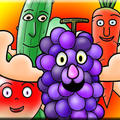مرة واحدة بطريق الخطأ جاء عبر الفيديو الذي طالب أمريكا الذين جاءوا للدراسة في اليابان، وقال كيف حياتها في بلد مختلف تماما. بالإضافة إلى مساحة صغيرة حيث يعيش الطلاب، وقال انه ضرب نهج الياباني لجمع القمامة. على الرغم من أن الغرفة كانت صغيرة، ووضعها في عدة حاويات، التي جمعها الطلاب المختلفة القمامة. وجاء كل صباح «زبال» وأخذوا بالفعل «تصنيف» القمامة لإعادة التدوير. هذه الحلقة أتذكر كثيرا، وسيكون رائعا إذا اتخذت جذور النظام في بلدنا. ونحن الآن في شكل قروض «تنظيف» و «تصنيف» من الحطام، وشكل لغوي فقط، وستحقق في استخدام الكلمات الإنجليزية التي تشير إلى سلة المهملات.

في سياق الفضلات البشرية الحياة، والقمامة، ورمي القمامة، والمواد المهملة، ورمي القمامة وهلم جرا. في اللغة الإنجليزية، على أنقاض أيضا يمكن القول بشكل مختلف: rubbish garbage trash litter waste junk debris لقد حان الوقت، أخيرا، أن تنتشر القمامة على الرفوف!
Once I accidentally came across a video in which American student who came to study in Japan, told how her life is in a completely different country. Besides the small space where the students lived, he struck the Japanese approach to garbage collection. Despite the fact that the room was tiny, it was placed in several containers, in which students collected various garbage. Every morning came «scavenger» and took away already «categorized» trash for recycling. This episode I remember very much, and it would be just wonderful if the system has taken root in our country. And now we are as loans «cleaning» and «categorization» of debris, only linguistic format, and will investigate the use of English words denoting the trash.
In the course of human life litters, litter, throwing garbage, discarded material, throwing rubbish and so on. In English, on the debris also can be said differently: rubbish, garbage, trash, litter, waste, junk, debris. It is time, finally, to spread out the trash on the shelves!
Колись я випадково надибав відео, в якому американська студентка, що приїхала вчитися до Японії, розповідала, як їй живеться в зовсім іншій країні. Крім маленького простору, де жили студенти, вразив підхід японців до прибирання сміття. Незважаючи на те, що кімната була крихітна, в ній містилося кілька контейнерів, в які студенти збирали різне сміття. Щоранку приїжджав «сміттяр» і забирав уже «категоризувати» сміття для подальшої переробки. Цей епізод запам’ятався мені дуже сильно, і було б просто чудово, якби ця система прижилася і у нас. А зараз ми з вами також займаємося «прибиранням» і «категоризацією» сміття, тільки в лінгвістичному форматі, і розберемося у вживанні англійських слів, що позначають сміття.
В процесі своєї життєдіяльності людина смітить, смітить, кидає сміття, викидає відходи, викидає непотріб і так далі. В англійській мові про сміття також можна сказати по-різному: rubbish, garbage, trash, litter, waste, junk, debris. Пора, нарешті, розкласти сміття по поличках!
Тем не менее, даже сами американцы частенько не знают разницы между этими словами, поэтому, можно спокойно употреблять любое из них.
Хоть «мусорная» тема и не считается одной из самых приятных, но английская лексика по этой теме впечатляет своим разнообразием. Может, оттого, что в англоязычных (и уже и в некоторых азиатских) странах люди привыкли сортировать ненужные вещи и отходы и поэтому, дабы правильно подписать контейнеры, решили дать разным видам мусора разные названия. Хотя пока что практика его сортировки добралась до наших краев лишь частично, но лексику по этой теме мы рассмотрим полностью.

- Trash
- Garbage
- Rubbish
- Litter
- Waste
- Junk
- Trash garbage and rubbish are all the same except garbage used as an insult only about 50% as often as trash and rubbish, litter is used in a more environmental context and is not used as an insult. Litter is basically rubbish/trash/garbage if they were vandalism
- British english and american english
- @kondratenkoviktoria there isn’t really a difference, but litter can also mean things that are scattered about, whether they are garbage or not. For example
- Trash, rubbish and garbage all mean the same thing, ごみ. Litter is trash that is left in public places where it shouldn’t be, and is also a verb for doing so.
- Garbage and trash are the same. It can be any kind of garbage or trash, there is no difference for kitchen refuse.
- Garbage and trash are the same thing. Litter is a form of trash that is scattered around on the streets instead of being properly disposed of. Rubbish is commonly used in the UK, but is the same as garbage and trash. Waste could be any form of undesirable material, trash is one example of that.
- @sue90 Yes, both garbage and trash can be used when talking about food waste. They are interchangeable for the most part, but trash and garbage are more commonly used terms.
- Trash, garbage, rubbish
- Debris
- Conclusion
Trash
Самый «безобидный» мусор – в основном, сухой. Это могут быть обертки от конфет, бумага или картонные коробки. Обычно всякий trash копится в офисах.
Garbage
А вот это уже не безобидные пластиковые тарелки и картонные упаковки, а самый мерзкий влажный и «благоухающий» мусор. В основном это пищевые отходы, которые спустя сутки нахождения в мусорном ведре превращаются в настоящее химическое оружие.
Rubbish
Британский аналог для и одновременно.
У этих трех слов () есть и второе значение – если вы любитель послушать или посмотреть английские передачи, фильмы или сериалы в оригинале, то оно уж точно встречалось вам не один раз. Так обычно клеймят нечто глупое, всякую ерундистику, чушь и чепуху. А еще так вы можете назвать фильм, который вам ужасно не понравился.
Litter
Самый раздражающий вид мусора, ведь находится он не в контейнере, а у вас под ногами. Выброшенная сигаретная пачка, смятые газеты и упаковки из-под соков, которые какой-то косоглазый редиска выбросил мимо урны.
Waste
Иногда и не мусор вовсе, а просто то, что вам уже не нужно. Может, вы снесли на мусорку уже надоевшее пальто, или по ошибке выбросили матрас, набитый деньгами и бриллиантами. А может, вы купили шестнадцатую по счету пару туфель на двадцатисантиметровом каблуке, которые в жизни не наденете – тогда вы потратили деньги впустую (to waste money – слово существует еще и в форме глагола).
Junk
И замыкает нашу подборку всякая рухлядь, вещи, которые уже непригодны для использования – трухлявая и ржавая машина, которая испустила свой предсмертный хрип еще в прошлом веке, дырявые панталоны или коллекция пивных бутылок.
Мы уверены, что когда технология сортировки мусора доберется до нас, вы с легкостью ей овладеете и легко запомните, какой контейнер за какой мусор отвечает. Ну а пока вы сможете похвастаться своим знанием английской лексики на эту тему.
Была ли статья полезна?
The words are not synonyms because the mental pictures created in the listener’s mind will be different. For anyone interested in this way of thinking about words / definitions, I encourage you to read «Louder than Words.»
All of my definitions are from The AHD, except Rubbish, from Cambridge Advanced Learners.
Waste: (verb) To use, consume, or spend thoughtlessly or carelessly. Waste has an idea of leftovers or things not entirely consumed. An office waste basket would have paper, paper clips, receipts, and other things in it that are considered leftovers or weren’t used because they were extraneous. This is why we say «industrial waste,» and not «industrial garbage / litter.» In 100 years, hopefully, the expression «industrial waste» will be considered an unfortunate thing of the past, in the same way as «the electric chair.»
Rubbish: AHD—worthless material, Cambridge—waste material or things that are no longer wanted. I include the British definition because in BrE, rubbish carries a similar meaning as waste in AmE. However, I feel that regardless of the speaker’s native form of English, if you were to ask them to draw pictures of rubbish or waste, there would be significant difference and similarities. Also, in BrE people say «That’s a load of rubbish,» or «Quit talking rubbish.» In AmE people would say «That’s a load of BS,» or «Quit talking trash / BS.» (If anyone has some better «conversions» I would welcome those.)
Trash: To throw away or discard / worthless material. Also Empty words, worthless ideas, worthless or offensive literary material. It would seem then that trash and waste have similar meanings in some cases, but in others not so much. Waste basket and trash basket might be considered similar. But we don;t say «Quit talking waste,» or «You’re being trashful.»
Refuse: Items discarded as useless or worthless. I think a refuse pile is very different from a garbage heap. In my mind, I picture old washing machines, printers, metal parts, bike tires, computer cables, car parts, etc. Garbage heaps smell and have things that are generally of lesser value.
In no way is this a scientific ordering but, I think one could order the words in terms of «grossness factor,» thus:
1) Garbage 2) Trash 3) Rubbish (US perspective) / Waste 4) Litter 5) Refuse
I think it would be an interesting experiment to ask AmE or BrE speakers to describe the contents of «Rubbish bin» «Trash can,» or «garbage can,» and «waste basket.»
This is a topic that could easily fill 20 pages of discussion about all the different uses, mental pictures created, word history, change of word meaning through history (check out Corpus of Historical American English), and etymology. Because of this, I don’t think it’s possible to give a quick summary that tells all.
Обновлено на
6 авг. 2022

Вопрос про Английский (британский вариант)

When you «disagree» with an answer

Trash garbage and rubbish are all the same except garbage used as an insult only about 50% as often as trash and rubbish, litter is used in a more environmental context and is not used as an insult. Litter is basically rubbish/trash/garbage if they were vandalism

British english and american english

@kondratenkoviktoria there isn’t really a difference, but litter can also mean things that are scattered about, whether they are garbage or not. For example
Previous question/ Next question
Символ показывает уровень знания интересующего вас языка и вашу подготовку. Выбирая ваш уровень знания языка, вы говорите пользователям как им нужно писать, чтобы вы могли их понять.
- Мне трудно понимать даже короткие ответы на данном языке.
- Могу задавать простые вопросы и понимаю простые ответы.
- Могу формулировать все виды общих вопросов. Понимаю ответы средней длины и сложности.
- Понимаю ответы любой длины и сложности.
Что такое «подарки»?
Show your appreciation in a way that likes and stamps can’t.
By sending a gift to someone, they will be more likely to answer your questions again!

If you post a question after sending a gift to someone, your question will be displayed in a special section on that person’s feed.
Обновлено на
10 сент. 2020

Вопрос про Английский (американский вариант)

Rubbish is British English Garbage and trash are for US english.Trash is more common in US Garbage is more common in US Litter is any garbage NOT in a garbage can. Somebody left it on the ground
In US and Canada, trash and garbage can also be adjectives.
Waste might mean garbage in Britain.
But in all English speaking countries, waste has a bigger meaning than “garbage.”
This is a waste of money = I shouldn’t have bought this. I regret buying this This is a waste of time = I regret doing this, I should have done something else

Приложение вопросов и ответов, в котором носители языка отвечают на ваши вопросы!
Обновлено на
9 мая 2021


They are all synonyms.
“Trash and Rubbish are the same, but “trash” is used more in America, and “rubbish” is more British.
Litter means trash/garbage/rubbish that is outside, thrown on the ground. “litter” can also be a verb, if I throw my garbage on the ground, I am littering. If I see someone littering, I might say: “Hey, don’t litter.”
“Littered” can also be an adjective, meaning “strewn around randomly”. If I have spilled papers on my floor, then my floor is “littered with papers”.

Trash, rubbish and garbage all mean the same thing, ごみ. Litter is trash that is left in public places where it shouldn’t be, and is also a verb for doing so.
Does garbage refer to trash in general? I was told that garbage usually means kitchen refuse.
Garbage and trash are the same. It can be any kind of garbage or trash, there is no difference for kitchen refuse.
According to the dictionary, it refers to unwanted waste (and usually domestic waste) that typically nobody wants. Trash is stuff you throw away (that maybe someone could want although it’s unlikely). In most situations they should be interchangeable.
All of these can also be used as insults (e.g. your ideas are trash/garbage/rubbish) in which case they all pretty much mean the same thing, your ideas are くそ.
They are all the same thing but rubbish is a word that British people tend to say. Most Americans say Trash or Garbage.However the way you use it for ゴミ箱varies
Americans usually sayTrash bin, Garbage can, Trash canBritish people usually say rubbish bin
Your answer has helped me understand them much deeper.Thank you!
У вас есть вопрос, на который нет ответа в словаре или электронном переводчике? Спросите у носителя языка!
Обновлено на
15 авг. 2018


Garbage is interchangeable with trash. «Garbage Can» = «Trash bin». «I’m taking out the garbage» = «I’m taking out the trash». «This bag is for garbage» = «This bag is for trash».
Litter is seen more as garbage/trash that didn’t make its way to the trash bin/garbage can. Loose items (bottles, cans, food) on the side of the road or on the ground is litter.
Rubbish, I think, can be used in any of those contexts. Again, it’s not commonly used where I’m from so I can’t give a good idea.

Garbage and trash are the same thing. Litter is a form of trash that is scattered around on the streets instead of being properly disposed of. Rubbish is commonly used in the UK, but is the same as garbage and trash. Waste could be any form of undesirable material, trash is one example of that.
how about food? when referring to food waste, can both garbage and trash be used? Ive heard of garbage being used in that meaning before..not sure of trash
also if three of them are all same are they totally interchangeable? thank you both 🙂
@sue90 Yes, both garbage and trash can be used when talking about food waste. They are interchangeable for the most part, but trash and garbage are more commonly used terms.
Наступне слово для позначення сміття — junk. Його зазвичай використовують, коли говорять про мізерії, непотребі, покидьках, т. Е. Про ті речі, які не мають ніякої цінності або зовсім непридатні для використання.
That car is a piece of junk. — Ця машина — просто старий мотлох.
Як дієслово junk використовується в значенні «позбавлятися від чого-небудь».
We decided to junk our old computer and buy a new one. — Ми вирішили викинути наш старий комп’ютер і купити новий.
Наведу кілька словосполучень зі словом junk:
- Waste (wastepaper) basket — корзина для сміття.
- Junk food — нездорова, сурогатна їжа.
- Junk e-mail — непотрібні повідомлення електронної пошти (спам).
- Junk shop — магазин вживаних речей.

Trash, garbage, rubbish
Почнемо з трьох найбільш вживаних слів: trash, garbage, rubbish. Цими словами називають мотлох, покидьки, сміття. У чому ж відмінність? Все просто.
Основна відмінність в тому, що trash — це найчастіше «сухий» сміття, т. Е. Коробки, папір, пакети, пластикові пляшки.
Garbage / ‘ɡɑː (r) bɪdʒ / позначає «вологий» сміття, т. Е. Те, що може гнити, наприклад, харчові відходи. Однак зараз обидва слова дуже часто вживаються як синоніми в американському англійською, а в британському англійською їм відповідає слово rubbish. Отже, короткий висновок — American English: trash (paper, plastic) or garbage (food waste), British English: rubbish.
Take out the trash, please. — Прибери сміття, будь ласка.
Throw the can in the garbage. — Кинь цю бляшанку на сміття.
Heaps of stone, bricks, and rubbish obstructed the approaches. — Кучи каменю, цегли і сміття закривали підхід.
Для тих, кому легше уявити різницю в значеннях за допомогою наочних прикладів, рекомендую подивитися невелике відео, в якому представлено короткий і зрозумілий опис різниці між trash, garbage і rubbish.

Розберемося з другим значенням слів trash / garbage / rubbish — «дурниця, нісенітниця, дурниця». У цьому значенні вони найчастіше і вживаються у фільмах і передачах.
Maybe you should read a book instead of watching that garbage on TV. — Може, ти почитаєш книгу, замість того, щоб дивитися цю дурницю по телевізору.
The food at that restaurant is complete rubbish. — Їжа в цьому ресторані — цілковита дрянь.
I can not believe you’re reading that trash. — Не можу повірити, що ти читаєш цю дурницю.
Словосполучення зі словами trash / garbage / rubbish найчастіше позначають якісь предмети або людей, пов’язаних з прибиранням сміття.
- Rubbish / trash / garbage bin — урна, контейнер для сміття.
- Rubbish / trash / garbage dump — звалище.
- Trash / garbage man — сміттяр.
- Trash-talk — словесна перепалка, зазвичай з метою похвалити себе і принизити, деморалізувати суперника.
المضي قدما والتعامل مع الكلمة litter إذا trash / garbage / rubbish خارج مكان في القمامة، وفي الشوارع وعلى الطريق، ويصبح تلقائيا litter — القمامة، والقمامة تركت في المكان الخطأ. الفعل، على التوالي، ومن المقرر أن «القمامة، والقمامة».
The streets were littered with paper and popcorn after the parade. – بعد العرض. The streets were littered with paper and popcorn after the parade. – The streets were littered with paper and popcorn after the parade. – الورق والفشار تناثرت في الشوارع بعد العرض.
We decided to pick up the litter in the park. – الحديقة. We decided to pick up the litter in the park. – We decided to pick up the litter in the park. – لقد قررنا جمع القمامة في الحديقة.
- Litter basket / litterbin — المزبلة.
- Litterbug — الناس الذين القمامة في الشوارع.
لرمي النفايات، يمكنك حتى الحصول على ركلة جزاء fine بحيث تولي اهتماما هنا في هذه الآية:

Go ahead and deal with the word litter. If trash / garbage / rubbish are out of place in a garbage can, and in the street and on the road, it automatically becomes a litter — litter, trash left in the wrong place. The verb, respectively, is set to «litter, litter.»
The streets were littered with paper and popcorn after the parade. — Paper and popcorn littered the streets after the parade.
We decided to pick up the litter in the park. — We have decided to collect garbage in the park.
- Litter basket / litterbin — rubbish bin.
- Litterbug — people who litter the streets.
For littering, you can even get a penalty (fine), so pay attention here on this sign:
Next word for debris — junk. It is commonly used when talking about junk, trash, garbage, t. E. About things that have no value or completely unusable.
That car is a piece of junk. — This machine — just old stuff.
As a verb junk used to mean «to get rid of anything.»
We decided to junk our old computer and buy a new one. — We decided to throw our old computer and buy a new one.
Here are a few phrases with the word junk:
- Waste (wastepaper) basket — trash.
- Junk food — unhealthy food surrogate.
- Junk shop — second hand store.
Йдемо далі і розбираємося зі словом litter. Якщо trash / garbage / rubbish знаходяться не на своєму місці в сміттєвому баку, а на вулиці і на дорозі, то він автоматично стає litter — сор, сміття, залишене в недозволеному місці. Дієслово, відповідно, має значення «смітити, смітити».
The streets were littered with paper and popcorn after the parade. — Папірці і попкорн валялися на вулицях після параду.
We decided to pick up the litter in the park. — Ми вирішили зібрати сміття в парку.
- Litter basket / litterbin — урна для сміття.
- Litterbug — людина, яка смітить на вулицях.
За розкидання сміття можна навіть отримати штраф (fine), тому звертайте увагу ось на такий знак:
Debris
These were the main word for garbage, but lately the news is often possible to hear the word of debris / debriː /, which is used to refer to large debris, debris, debris:
Everything was covered by dust and debris. — Everything was strewn with rubble and dust.
Here you can see a video of how the garbage to wash off the coast of Japan during the tsunami (marine debris), sailed to Hawaii and made ecological disaster:
Продовжуємо категоризувати сміття і переходимо до слова waste, яке позначає «покидьки, відходи, щось непотрібне, невикористовуване».
We need to find ways to recycle unnecessary waste. — Нам треба знайти способи переробити непотрібні відходи.
Крім іменника, слово waste може бути прикметником зі значенням «непридатний, даремний, невикористовуваний», наприклад, waste talents — розтрачені таланти. Крім того, ми зустрічаємо слово waste в якості дієслова, який означає «витрачати, спустошувати».
He always wasted his money on useless gadgets. — Він постійно витрачав гроші на непотрібні гаджети.
Зі словом waste зустрічається кілька ідіом:
- To go to waste — пропадати даремно.
- Lay waste to — руйнувати.
- Waste one’s breath — говорити попусту, тріпати язиком.
- Haste makes waste — поспішиш — людей насмішиш.
- Waste not, want not — хто даремно не витрачає, тому не знати потреби.
А тепер кілька прикладів:
It’s wrong to let good food go to waste. — Не можна дозволяти гарної їжі пропадати даремно.
The teacher saw that she was wasting her breath; children refused to believe her. — Вчителька бачила, що вона говорить даремно, діти відмовлялися їй вірити.
Forest fires lay waste thousands of acres every year. — Лісові пожежі щорічно знищують тисячі акрів лісу.
It is a case of haste making waste. — Ось що значить поспішиш — людей насмішиш.
Також, зверніть увагу на словосполучення зі словом waste:
- Waste (wastepaper) basket — корзина для сміття.
- To waste words — кидати слова на вітер.
- Waste of time — марна трата часу.
- Waste of money — марна трата грошей.
الكلمة التالية للالحطام — junk وهي تستخدم عادة عندما نتحدث عن غير المرغوب فيه، والقمامة، والقمامة، ر. E. عن الأشياء التي ليس لها قيمة أو غير صالحة للاستعمال تماما.
That car is a piece of junk. – That car is a piece of junk. – هذا الجهاز — الاشياء القديمة فقط.
كفعل junk تستخدم لتعني «للتخلص من أي شيء.»
We decided to junk our old computer and buy a new one. – واحدة جديدة. We decided to junk our old computer and buy a new one. – We decided to junk our old computer and buy a new one. – قررنا رمي الكمبيوتر القديم لدينا وشراء واحدة جديدة.
وفيما يلي بعض العبارات مع كلمة junk
- Waste wastepaper basket — سلة المهملات.
- Junk food — صحي بديل الغذاء.
- Junk e-mail — رسائل البريد الإلكتروني غير المرغوب فيها (البريد المزعج).
- Junk shop — الثاني مخزن اليد.
We continue to categorize the garbage and go to the word waste, which means «the dregs, waste, something unnecessary, unused.»
We need to find ways to recycle unnecessary waste. — We need to find ways to recycle unwanted waste.
In addition to the noun, the word waste can be an adjective meaning «unusable, useless, dead», for example, waste talents — talents wasted. In addition, we find the word of waste as a verb that means «to waste, ravage.»
He always wasted his money on useless gadgets. — He always spent money on useless gadgets.
The word waste meets several idioms:
- To go to waste — to waste.
- Lay waste to — destroy.
- Waste one’s breath — talking in vain, gab.
- Haste makes waste — haste makes waste.
- Waste not, want not — who does not spend in vain, to not know the needs.
And now a few examples:
It’s wrong to let good food go to waste. — You can not afford to waste good food.
The teacher saw that she was wasting her breath; children refused to believe her. — The teacher saw that she says nothing, the children refused to believe her.
Forest fires lay waste thousands of acres every year. — Forest fires annually destroy thousands of acres of forest.
It is a case of haste making waste. — That’s what haste makes waste.
Also, pay attention to the phrase with the word waste:
- Waste (wastepaper) basket — trash.
- To waste words — to throw words to the wind.
- Waste of time — a waste of time.
- Waste of money — a waste of money.
Let’s start with the three most used words: trash, garbage, rubbish. These words are called trash, scum, trash. What is the difference? It’s simple.
The main difference is that trash — is often «dry» waste, t. E. Boxes, paper bags, plastic bottles.
Garbage / ‘ɡɑː (r) bɪdʒ / means «wet» waste, t. E. That can rot, such as food waste. Now, however, the two words are often used interchangeably in American English and in British English it corresponds to the word rubbish. So, a brief conclusion — American English: trash (paper, plastic) or garbage (food waste), British English: rubbish.
Take out the trash, please. — Take the trash, please.
Throw the can in the garbage. — Throw it in the garbage tin.
Heaps of stone, bricks, and rubbish obstructed the approaches. — Heaps of stones, bricks and debris closed approach.
For those who are easier to imagine the difference in the values using visual examples, I recommend to watch a short video, which provides a brief and clear description of the difference between trash, garbage and rubbish.
Let us examine the second meaning of the words trash / garbage / rubbish — «nonsense, nonsense, nonsense.» In this sense, they are most often used in movies and broadcasts.
Maybe you should read a book instead of watching that garbage on TV. — Perhaps you read a book instead of watching this crap on TV.
The food at that restaurant is complete rubbish. — The food in this restaurant — a complete mess.
I can not believe you’re reading that trash. — I can not believe what you read this nonsense.
Phrases with the words trash / garbage / rubbish often represent any objects or people associated with garbage collection.
- Rubbish / trash / garbage bin — urn trash.
- Rubbish / trash / garbage dump — dump.
- Trash / garbage man — a scavenger.
- Trash-talk — verbal sparring, usually with the aim to praise themselves and belittle, demoralize the opponent.
Це були основні слова для позначення сміття, проте останнім часом в новинах часто можна почути слово debris / debriː /, яке використовується для позначення крупного сміття, осколків, уламків:
Everything was covered by dust and debris. — Все було всипане уламками і пилом.
Тут можна подивитися відео про те, як сміття, змитий з берегів Японії під час цунамі (marine debris), приплив на Гаваї і влаштував екологічну катастрофу:
وكانت هذه الكلمة الرئيسية لالقمامة، ولكن في الآونة الأخيرة الأخبار من الممكن في كثير من الأحيان لسماع كلمة من debris / debri ː /، والذي يستخدم للإشارة إلى الحطام الكبيرة، والحطام، والحطام:
Everything was covered by dust and debris. – Everything was covered by dust and debris. – وتتناثر كل شيء مع الركام والغبار.
هنا يمكنك ان ترى الفيديو لكيفية القمامة لغسل قبالة سواحل اليابان خلال موجات المد marine debris أبحرت إلى هاواي وجعلت كارثة بيئية:
دعونا نبدأ مع ثلاث كلمات الأكثر استخداما: trash garbage rubbish وتسمى هذه الكلمات القمامة، حثالة، والقمامة. ما هو الفرق؟ انها بسيطة.
والفرق الرئيسي هو أن trash — في كثير من الأحيان النفايات «الجافة»، ر E. صناديق وأكياس الورق والزجاجات البلاستيكية.
Garbage / ‘ (r)b ɪ d ʒ / يعني النفايات «الرطب»، ر. E. ويمكن أن تتعفن، مثل فضلات الطعام. الآن، ومع ذلك، وغالبا ما تستخدم كلمتين بالتبادل باللغة الإنجليزية الأمريكية والإنجليزية البريطانية أنه يتوافق مع كلمة rubbish لذلك، وخلاصة موجزة — American English trash paper plastic or garbage food waste British English rubbish
Take out the trash, please. – Take out the trash, please. – خذ سلة المهملات، من فضلك.
Throw the can in the garbage. – Throw the can in the garbage. – رميها في القمامة القصدير.
Heaps of stone, bricks, and rubbish obstructed the approaches. – عرقلت النهج. Heaps of stone, bricks, and rubbish obstructed the approaches. – Heaps of stone, bricks, and rubbish obstructed the approaches. – أغلقت أكوام من الحجارة والطوب والحطام النهج.
بالنسبة لأولئك الذين هم أسهل أن نتخيل الفرق في القيم باستخدام أمثلة البصرية، أوصي لمشاهدة شريط فيديو قصير، الذي يقدم وصفا موجزا واضحا الفرق بين trash garbage rubbish
دعونا نبحث في المعنى الثاني من الكلمات trash / garbage / rubbish — «هراء، هراء، هراء» في هذا المعنى، وغالبا ما تستخدم في الأفلام والبرامج الإذاعية.
Maybe you should read a book instead of watching that garbage on TV. – مشاهدة هذا القمامة على شاشة التلفزيون. Maybe you should read a book instead of watching that garbage on TV. – Maybe you should read a book instead of watching that garbage on TV. – ربما كنت أقرأ كتابا بدلا من مشاهدة هذا هراء على شاشة التلفزيون.
The food at that restaurant is complete rubbish. – The food at that restaurant is complete rubbish. – الطعام في هذا المطعم — فوضى كاملة.
I can’t believe you’re reading that trash. – القمامة. I can’t believe you’re reading that trash. – I can’t believe you’re reading that trash. – لا أستطيع أن أصدق ما قرأت هذا الهراء.
العبارات مع عبارة trash / garbage / rubbish في كثير من الأحيان تمثل أي الأشياء أو الأشخاص المرتبطين جمع القمامة.
- Rubbish / trash / garbage bin — القمامة جرة.
- Rubbish / trash / garbage dump — تفريغ.
- Trash / garbage man — زبال.
- Trash-talk — السجال اللفظي، وعادة بهدف الثناء أنفسهم والتقليل من شأن، تحطيم معنويات الخصم.
نستمر في تصنيف القمامة والذهاب إلى الكلمة waste وهو ما يعني «الثمالة، والنفايات، وهو أمر غير ضروري، غير المستخدمة».
We need to find ways to recycle unnecessary waste. – النفايات. We need to find ways to recycle unnecessary waste. – We need to find ways to recycle unnecessary waste. – نحن بحاجة إلى إيجاد سبل لإعادة تدوير النفايات غير المرغوب فيها.
بالإضافة إلى اسم، كلمة waste يمكن أن تكون صفة تعني «غير صالحة للاستعمال، لا طائل منه، ميتة»، على سبيل المثال، waste talents — مواهب تهدر. بالإضافة إلى ذلك، نجد كلمة من waste كما فعل يعني «أن تضيع، تنهش».
He always wasted his money on useless gadgets. – He always wasted his money on useless gadgets. – أمضى دائما المال على الأدوات غير مجدية.
كلمة waste تجتمع عدة التعابير:
- To go to waste إلى النفايات.
- Lay waste to — تدمير.
- Waste one’s breath — الكلام عبثا، ثرثرة.
- Haste makes waste — في العجلة الندامة.
- Waste not, want not — الذي لا ينفق من دون جدوى، لعدم معرفة الاحتياجات.
والآن بعض الأمثلة:
It’s wrong to let good food go to waste. – سدى. It’s wrong to let good food go to waste. – It’s wrong to let good food go to waste. – أنت لا تستطيع أن تضيع والطعام الجيد.
The teacher saw that she was wasting her breath; children refused to believe her. – التنفس. The teacher saw that she was wasting her breath; children refused to believe her. – The teacher saw that she was wasting her breath; children refused to believe her. – رأى المعلم أن تقول شيئا، رفض الأطفال ليصدقها.
Forest fires lay waste thousands of acres every year. – عام. Forest fires lay waste thousands of acres every year. – Forest fires lay waste thousands of acres every year. – حرائق الغابات تدمر سنويا آلاف الهكتارات من الغابات.
It is a case of haste making waste. – It is a case of haste making waste. – وهذا ما يجعل العجلة النفايات.
أيضا، وإيلاء الاهتمام لهذه العبارة مع كلمة waste
- Waste wastepaper basket — سلة المهملات.
- To waste words لرمي الكلمات للريح.
- Waste of time — مضيعة للوقت.
- Waste of money — مضيعة للمال.
Conclusion
Отже, ми розібралися зі сміттям, а зараз підведемо підсумки:
- Синоніми, що позначають сміття, відходи, покидьки — trash / garbage / rubbish.
- Сміття, сміття, що знаходиться в недозволеному місці — litter.
- Відходи, не використовуються або непотрібні речі — waste.
- Мотлох, мізерія, речі, що не мають цінності — junk.
- Уламки, осколки, великий сміття — debris.
І, нарешті, невелике завдання для роздумів. Відома англійська прислів’я говорить: One man’s trash is another man’s treasure. А як ви її розумієте? Поговорим?
І в кінці пропоную пройти невеликий тест:
لذلك نحن برزت مع القمامة، وتلخيص الآن:
- مرادفات تعيين القمامة والنفايات والتخلص منها — trash / garbage / rubbish
- القمامة، القمامة، ويجري في المكان الخطأ — litter
- النفايات، والمواد غير المستعملة أو غير المرغوب فيها — waste
- القمامة، غير المرغوب فيه، والأشياء التي لا قيمة لها — junk
- حطام، حطام، حطام كبير — debris
وأخيرا، مهمة صغيرة للتفكير. المثل الإنجليزي الشهير يقول: One man’s trash is another man’s treasure كيف نفهم ذلك؟ الحديث؟
وفي نهاية أقترح لاجتياز اختبار قليلا:
So we figured out with the garbage, and now summarize:
- Synonyms designating trash, waste, discard — trash / garbage / rubbish.
- Rubbish, rubbish, being in the wrong place — litter.
- The waste, unused or unwanted items — waste.
- Trash, junk, things that have no value — junk.
- The wreckage, debris, large debris — debris.
Finally, a small task for thought. The famous English proverb says: One man’s trash is another man’s treasure. How do you understand it? Talk?





